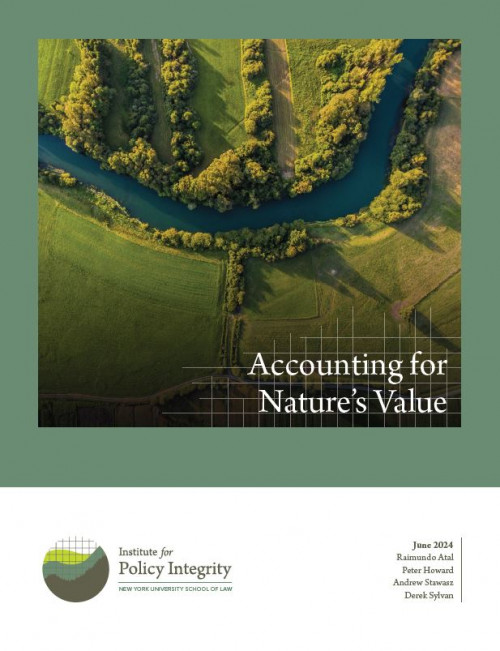-
Expert Declaration in Case Requesting a Stay of EPA’s Methane Rule for the Oil and Gas Sector
In March 2024, a set of states and industry groups asked the U.S. Court of Appeals for the District of Columbia Circuit to stay the implementation of EPA’s rule to limit methane emissions from the oil and gas sector. Our Economics Director, Peter Howard, authored an expert declaration defending the agency's development and use of new values for the social cost of methane in the rule.
-
Policy Integrity Comments Reflected in FERC’s Order 1977 on Backstop Siting Authority for Transmission Facilities
On May 13, 2024, FERC issued Order 1977 to implement its authority to site transmission facilities that have been rejected (or not acted upon) by states. In our comments, we asked FERC to clarify that the proposed requirement that applicants estimate reasonably foreseeable emissions for their proposed transmission facilities includes the projects' impacts on power-system emissions. In response, the Commission clarified that these power-sector emissions must be estimated where they are reasonably foreseeable. And, consistent with our comments' legal analysis, FERC confirmed its authority to require applicants to submit these and other air quality impacts under the Federal Power Act's backstop siting provision. FERC also agreed with our and others’ analysis that it has the statutory authority under the Federal Power Act and to also consider environmental justice impacts when exercising backstop siting authority. -
The Narrow Reinterpretation: The Oil and Gas Industry’s Retreat from the Broad Permitting Authority It Long Embraced
Published in the Harvard Environmental Law Review Online
What's the function of oil and gas permitting agencies? Despite broad statutory grants to federal agencies, oil and gas companies increasingly argue that the role of those agencies is to promote development regardless of whether it is socially desirable. But this “Narrow Reinterpretation,” in addition to lacking textual support, is at odds with longstanding practice. What changed? Not the governing statutes, at least not in pertinent part. But the energy sector has: renewable sources have replaced coal as the primary competitors to oil and gas.
-
Accounting for Nature’s Value
National accounts—which measure a country’s aggregate economic activity, including Gross Domestic Product (GDP)—largely ignore natural capital and ecosystem services. This omission occurs because national accounts heavily rely on market transactions to identify and value economic activity, whereas ecosystems’ contributions occur most commonly outside markets. This leads governments, businesses, and decisionmakers to ignore or misidentify some sources and uses of their income and wealth, skewing their decisionmaking. Recognizing these shortcomings, many countries, including the United States, are increasingly moving towards Natural Capital Accounting (NCA), a system of measuring natural capital and ecosystem services in a way that allows for their integration with national accounts. In this report, we provide an overview of NCA for non-economists.
-
Comments to FEMA on Proposed Rule to Modify the Standard Flood Insurance Policy Under the National Flood Insurance Program
The Federal Emergency Management Agency (FEMA) proposed a rule to modify the standard flood insurance policy under the National Flood Insurance Program by creating a new “Homeowner Flood Form,” which applies specifically to homeowners of single-family homes and owners of buildings with one-to-four units. The proposed amendments reflect sensible steps to simplify the standard flood insurance policy and to provide flexibility in coverage. We have suggested additional improvements to FEMA’s proposal and its underlying analysis.
-
Comments to EPA on Request for Input on Reducing Greenhouse Gas Emissions from Existing Fossil-Fuel-Fired Stationary Combustion Turbines
In May 2024, the Environmental Protection Agency (EPA) issued a request for input on reducing greenhouse gas (GHG) emissions from existing fossil fuel-fired stationary combustion turbines. The Institute for Policy Integrity submitted comments to EPA, providing recommendations on key issues for the agency to consider as it develops new regulations.
-
Policy Integrity Comments Reflected in FERC’s Order 1920 on Transmission Planning and Cost Allocation
On May 13, 2024, FERC issued Order 1920, a landmark rule to improve regional transmission planning and cost allocation processes. The Order could ease the process of expanding electric transmission, helping integrate much more renewable energy to the U.S. grid. We submitted four rounds of comments in this proceeding: at the advanced notice of proposed rulemaking stage, then on the proposal, and then two sets of supplemental comments. For several key features of the final rule, FERC adopted our recommendations.
-

The Social Cost of Greenhouse Gases: An Overview
A Primer on EPA’s Updated Values for Policymakers and Practitioners
In December 2023, EPA finalized updated values for the social cost of greenhouse gases (SC-GHG), following public comment and expert peer review. The agency derived these estimates using the best available science and economics, and the estimates represent a significant step forward in our ability to properly value climate effects. The brief is intended to introduce policymakers and practitioners to the SC-GHG, break down EPA's updated values, and explain why they represent a powerful tool that can streamline decisionmaking and policy analysis.
-
Policy Integrity Scholarship Cited in Letter from Four New England Senators to ISO-NE
On April 30, 2024, Senators Markey, Sanders, Warren, and Whitehouse sent a letter to ISO-NE President and CEO Gordon van Welie urging the independent system operator to improve its governance policies, proactively plan for new transmission, and ensure fair access to markets for clean energy technologies. The letter advocated for several changes that Policy Integrity has pushed in the past, including increasing opportunities for community participation in energy policy decisions and pursuing longer-term, holistic transmission planning. On the latter point, the letter cited our December 2023 report that advocated for more proactive transmission planning on the part of energy decisionmakers.
-
Comments to DOE on Notice of Intent Regarding Launching a Voluntary Carbon Dioxide Removal Purchasing Challenge
In March 2024, the Department of Energy published a Notice of Intent Regarding Launching a Voluntary Carbon Dioxide Removal Purchasing Challenge. To participate in the Purchasing Challenge, organizations must disclose to DOE several details about each associated carbon dioxide removal (CDR) credit, including the purchaser, supplier, underlying project, and crediting methodology. The Institute for Policy Integrity submitted comments recommending ways DOE could better balance concerns about the disclosure of commercially sensitive information with the benefits of allowing researchers and market actors to access price data.













